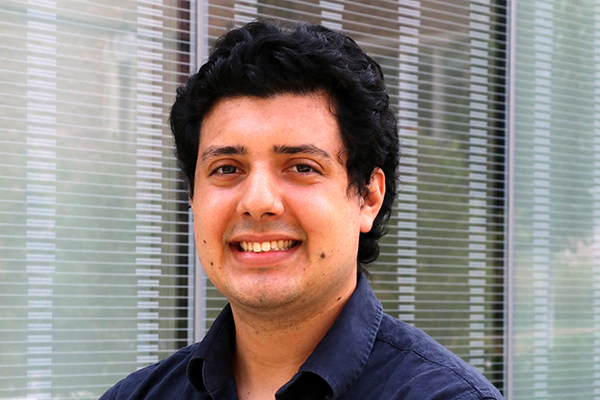Jordan Escarcega
Mechanical Engineering & Materials Science
Degree pursuing: PhD in mechanical engineering
Hometown: Costa Mesa, California

Where did you complete your undergraduate degree?
California State University Maritime Academy
Please provide your lab and description of research.
I work at the Bayly Lab in the Department of Mechanical Engineering & Materials Science. Our lab focuses on researching the mechanical response of the human brain in regard to traumatic brain injury. My research uses applied mechanics and vibrations theory to identify and understand modes of oscillation in the brain.
What played into your decision to get a graduate engineering degree?
During the summer after my junior year at Cal Maritime, I participated in a summer research program at Washington University. It was during this program that I learned about academic research while working in a lab studying the mechanics of cell flagella. Over the course of that summer, I developed an admiration for academic research, and I wanted to pursue it as a career. For me, academic research is enjoyable because I have the freedom to tackle complex problems in as many different ways as possible to push the boundaries of known engineering science.
Why did you pick WashU?
I picked WashU because of their outstanding faculty, their top-of-the-line research facilities, and because the MEMS department has a number of established labs that focus on biomechanics of various human tissues.
What was your favorite course and why?
Theory of Vibrations. This class teaches a more advanced overview of mechanical vibrations than what you would get in an undergrad class. The professor who teaches it also likes to apply this theory to actual problems that an industrial engineer might work on. There was also a segment on using finite element analysis (FEA) software to solve vibrations problems, so that was also a good experience.
Who is your favorite instructor and why?
Spencer Lake, associate professor of mechanical engineering & materials science. I took Elasticity with him my second semester, and I really enjoyed that class. He was clear and concise when going over the material, always available for questions from students, provided many in-class exercises so that we could practice the material, and he was fair with work and grading requirements.
What advice would you give to a new student?
Don't be afraid to reach out to professors before and after submitting an application to the university. They love talking about their research to prospective students and it could be a good way to get your foot in the door. When you start your PhD at WashU, it's also a good idea to have a plan for which labs you are going to rotate into as soon as possible. That way you can have an easier time near the end of each semester when the workload is highest.
What is your favorite thing about St. Louis?
My favorite thing about St. Louis is probably all of the activities that you can pursue around the area. There's rock climbing, the zoo, the aquarium, the Arch and Forest Park, just to name a few. The best part is that quite a few of these places are free or at a reduced cost for students. There are many fun things to do here in St. Louis.
What campus activities or groups would you recommend to a new student?
If you are in MEMS, I would definitely recommend participating in the social events planned by our Graduate Student Advisory Board. It's a great way to make friends and build connections with other students. The Association of Graduate Engineering Students (AGES) is another group that also hosts events for every engineering department, and I recommend going to their happy hours every month for free food and socialization.
Are you presently in the workforce or have any work history? If yes, please describe.
My only previous work was an internship at a power plant at Hoag Hospital in Newport Beach, California. My job was to learn about facilities engineering and about the different systems that encompass a hospital power plant. I learned how to take rounds of the various equipment, perform preventative maintenance and trace systems to better understand how they work.
What are your plans for the future?
My current plan once I graduate is to find a position at another university as a postdoc and hopefully work in academia in the future.
